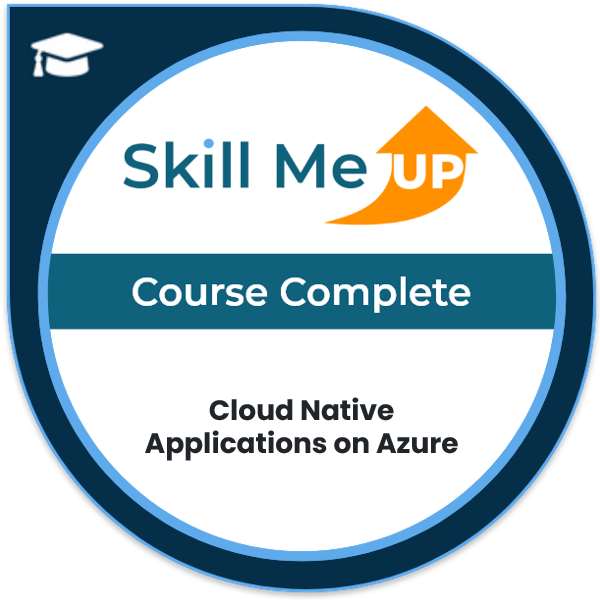Cloud Native Applications on Azure
Build, Deploy, and Scale Modern Applications with Containers and Azure Kubernetes Service
Transform the way you build and deliver applications with Azure’s powerful cloud-native platform.
This hands-on course is designed for developers, DevOps engineers, and IT professionals who want to modernize their applications and infrastructure using containers, microservices, and fully managed Azure services. Through expert-led instruction and real-world labs, you’ll learn how to build resilient, scalable, and secure cloud-native apps using Docker, Kubernetes, Azure Kubernetes Service (AKS), and Azure Container Apps.
What You'll Learn
Container Fundamentals: Learn how Docker containers work and how to package and run applications in portable, lightweight environments.
VS Code and Docker Dev Workflow: Use Visual Studio Code and Docker extensions to build, debug, and share containerized apps with ease.
Deploy to Azure Container Services: Push images to Azure Container Registry, then deploy using Azure Container Instances and Azure Container Apps.
Kubernetes Essentials: Get hands-on with Kubernetes architecture, Pods, ReplicaSets, Services, and Deployments on your own Linux VM.
Azure Kubernetes Service (AKS): Deploy secure, production-ready clusters with persistent storage, role-based access control, and advanced networking.
Monitoring and Auto-Scaling: Set up Prometheus, Azure Monitor, and configure autoscaling for both pods and cluster nodes to handle real-world load.
Who Should Take This Course?
Developers building containerized applications
DevOps engineers deploying microservices to Azure
IT pros transitioning from VMs to Kubernetes
Teams modernizing legacy applications for the cloud
Why Learn Cloud Native on Azure?
Azure provides a rich ecosystem for cloud-native development with integrated tools, managed services, and enterprise-grade security. Whether you're building greenfield apps or modernizing existing workloads, Azure empowers you to innovate faster with less infrastructure overhead.
Prerequisites
Basic understanding of cloud concepts
Experience with the command line
Familiarity with application development (any language)
Join the Cloud Native revolution—learn to build modern, resilient applications that thrive in the Azure cloud.
Start building cloud-native apps today.
- Category: Azure Cloud Computing
- Level: Advanced
- Time Estimate: 12h 30m
- Price: $499.99 for 3 months of access
- Subscription: $189.99 per month after 7-day free trial
- Lab Environment: Included
- Free Trial: 7 Days

Lessons in this Course

Lesson 1: Introduction to Containers with Docker
Learn how to containerize your applications for portability, speed, and consistency.
In this foundational lesson, you’ll get hands-on with Docker and discover how containers revolutionize the way apps are built and deployed. You’ll start by creating your first containerized application, learn how to build and tag Docker images, and understand how to persist data using volumes. You’ll also explore how to debug and inspect containers, and finally, orchestrate multiple containers using Docker Compose.
Whether you're new to containers or brushing up your skills, this lesson sets the stage for building modern cloud-native apps.
Duration: 2 h 30 mExercises

Lesson 2: Visual Studio Code and Containers
Streamline your development workflow with Docker and VS Code.
In this lesson, you’ll learn how to seamlessly build, run, and manage containers using Visual Studio Code. Discover how to update and rebuild containerized applications, share images via Docker Hub, and persist data using volumes and bind mounts. You’ll also dive into real-world development workflows and explore how multi-stage builds optimize your containers for production.
Perfect for developers who want to integrate containerization into their daily coding environment.
Duration: 2 h 30 mExercises

Lesson 3: Azure Container Apps and Container Instances
Deploy containerized applications to the cloud—fast, flexible, and serverless.
This lesson introduces you to two powerful Azure services for running containers: Azure Container Instances (ACI) and Azure Container Apps. You’ll learn how to build a Docker image from a .NET application, push it to Azure Container Registry, and deploy it to both ACI for on-demand compute and Container Apps for scalable microservices. No infrastructure management required.
Ideal for teams ready to take their containerized apps from local development to cloud deployment with minimal overhead.
Duration: 2 h 30 mExercises

Lesson 4: Introduction to Kubernetes
Master the fundamentals of container orchestration with Kubernetes.
In this lesson, you’ll get hands-on experience setting up a Kubernetes cluster on a Linux virtual machine. Learn how Kubernetes manages containerized applications using Pods, ReplicaSets, Services, and Deployments. You’ll deploy and scale applications using YAML manifests and understand the core building blocks that power modern, distributed systems.
A must-have introduction for developers and DevOps professionals looking to build production-ready applications with Kubernetes.
Duration: 2 h 30 mExercises

Lesson 5: Introduction to Azure Kubernetes Service (AKS)
Run secure, scalable Kubernetes clusters in Azure—without managing infrastructure.
This lesson takes your Kubernetes knowledge to the next level with Azure Kubernetes Service (AKS). You’ll deploy a production-grade AKS cluster with role-based access control, persistent storage, and advanced networking. Then, you’ll configure monitoring with Azure Monitor and Prometheus, and implement automated scaling for both pods and nodes.
Designed for professionals ready to operate cloud-native workloads at scale with the full power of Azure.
Duration: 2 h 30 m